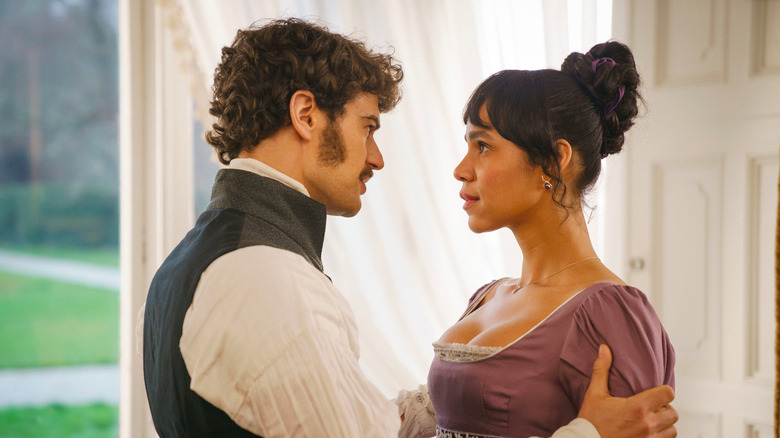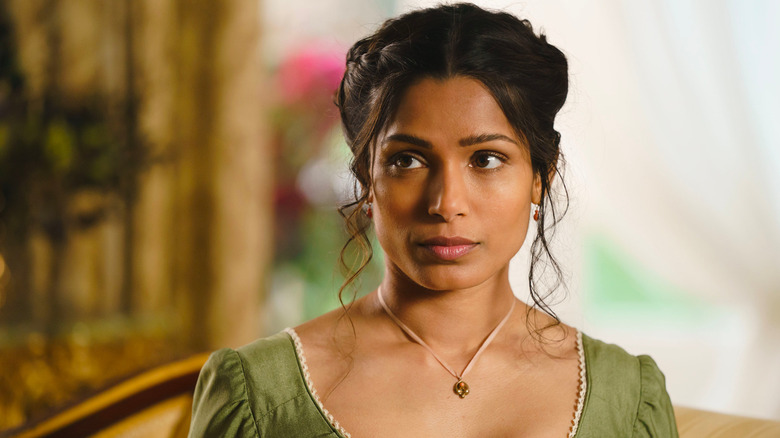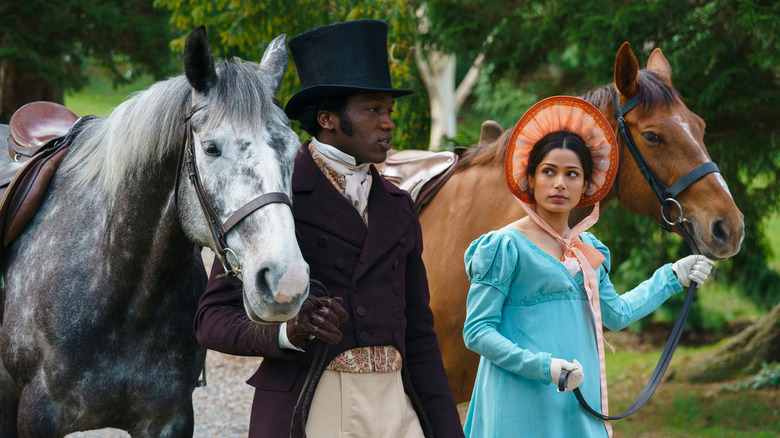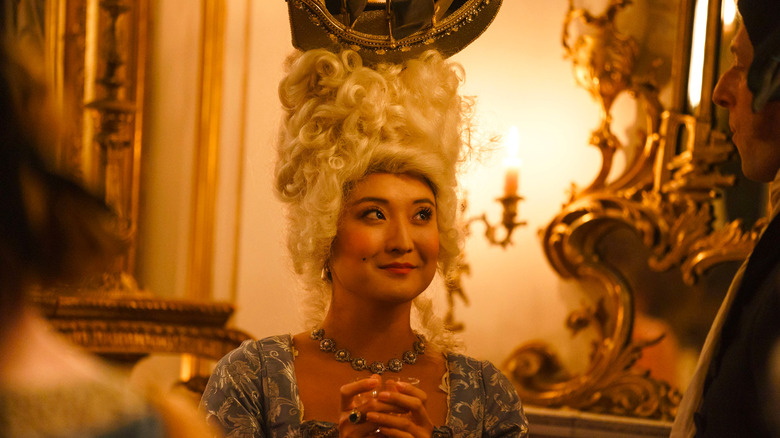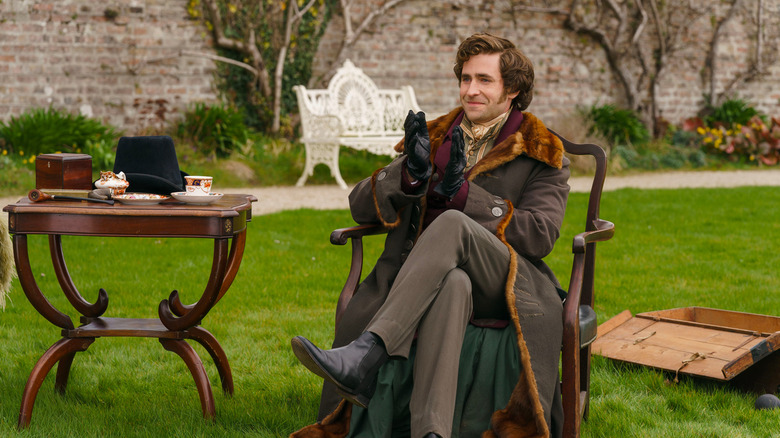Mr. Malcolm's List Writer Suzanne Allain On Adapting Her Novel For The Screen [Interview]
It's not every day that a novelist is able to see their work so quickly adapted into a film — and it can be even rarer to find a novelist that's also dexterous enough to adapt that work themselves. Suzanne Allain, the creator of "Mr. Malcolm's List," didn't know much about screenwriting when she first made the decision to turn her novel into a screenplay. But Allain's first attempt at an adaptation yielded incredible results: The Black List performed a live reading of her script in 2015, which in turn got the attention of director Emma Holly Jones.
Seven years (and one viral proof of concept) later, "Mr. Malcolm's List" the novel has evolved into a feature film. It's an experience that's kindled a love of screenwriting for Allain, and an outlet for the writer's penchant for research. Though the movie was Allain's first foray into film, it won't be her last. I recently sat down with Allain over Zoom to discuss her research process, the art of letting go, and what's next after "Mr. Malcolm's List."
'It was easy to envision them in a film'
Obviously this is a project that has been years in the making — I heard like 20 years for you.
Yes, that's when I originally wrote the book was 20 years ago. So yes, it's been a long process.
I absolutely love how your work can translate so seamlessly from the early 2000s romcom structure to the 19th century. How did you know that historical romance was the genre for you?
Well, it's the genre I've always loved. I was a huge fan of Jane Austen. There's another writer, Georgette Heyer, that was kind of like the first historical romance writer. She wrote Regency romances. She was the first one. She wrote them about 100 years after Jane Austen wrote "Pride and Prejudice." So yeah, I was just a big fan of the genre. I also am a big fan of more comedic writers, like P.G. Wodehouse, Oscar Wilde. What I wanted was the historical time period, Jane Austen's era, mixed with being a little more farcical and comedic perhaps than hers — although her works are extremely hilarious as well.
I'm also so in awe of the fact that you adapted your novel for the film because screenplays, they are an entirely different animal from novels. How did you approach the process of adapting your work?
Well, it was funny. I really didn't know a lot about screenwriting when I adapted it. It was my very first script I had ever written or attempted to write. So ... I actually don't know. It was funny. I was so naive at that point. I didn't even have Final Draft. I researched how to format. I remember I was reading all this "How to format a screenplay" stuff and I didn't want to necessarily invest in the software because I didn't know if this was what I was going to be doing. So I just tried to format it myself in Word. [Laughs] It was definitely a learning process. But I think that because I enjoy writing dialogue so much anyway — like even in writing novels, that was my favorite part, writing dialogue. So I feel like it was just a good fit for me and my particular skill set. And then I feel, too, my characters speak to me and they kind of live in my head. So it was easy to envision them in a film, in a movie.
But I did a lot of research. I read a lot of other really good scripts. So I took lessons from really good screenwriters and scripts that were very successful and well-written. So I read a lot of those. I did a lot of homework as far as reading books on screenwriting. And so I really tried to educate myself. And then I, originally, I kind of just entered a few free contests, like Amazon Studios at that time was just developing and searching for new talent. They had some free screenwriting contests that I entered. And "Mr. Malcolm's List" placed, it was a semifinalist. So I was like, "Oh! Okay, well ... maybe I should pursue this." And so then I uploaded it to The Black List website and that's eventually what took us to this point today. The director heard the table read that The Black List Table Read Podcast and she became attached, Emma Holly Jones. And then that's how we got here.
'Everybody expected me to speak with a British accent'
I've got to tell you, and I'm sure you've heard this so often. Your knowledge of the Regency era is astounding to the point that I did think that you were British.
Yeah! When I started doing like the rounds in Hollywood, after my script kind of got sent around there and I started doing generals and doing different meetings, everybody expected me to speak with a British accent. Like, they read it and they were sure that I was British, which I was really proud of because I thought, "Oh, my research did pay off." I remember a British producer actually emailing me after she read the script and she's like, "I could not believe that you were American and you wrote this script." So I do take a little pride in that. I did do a lot of research. Like even etymology dictionaries just to make sure I was treating the era with the word choice that I used. I wanted to avoid Americanisms and things like that. And I also, at the time, anytime I write books in this era, I read a lot from that era. So of course, I reread all of Jane Austen's novels and even some of her letters that she wrote her sister. So it's nice that we have the internet ... that's digitized, a lot of that stuff, so it makes it easier for research.
And it seems like you really love the research. Your Instagram is peppered with all kinds of fun facts and pictures of costumes. What was your favorite part of watching that world sort of evolve into a film?
Unfortunately I wasn't able to be there when they shot the feature, but I was there when they shot the short film in 2018. I was on set in London for three days. And I think what was the craziest to me were the horse-drawn carriages. I was just like, "There's this huge horse. And there's a coachman sitting there." I'm like, "What in the world?" So that was pretty crazy. But yeah, all the costumes are beautiful. I actually went yesterday since I am in New York, we just arrived and I went to Saks Fifth Avenue. They have a display in their windows here in New York of the costumes from the film. So I stood in front of it and obviously took a bunch of selfies and pictures. But yeah, the costumes are beautiful.
I guess, I think my favorite part of seeing it all come to life is just how the actors really were able to bring the humor alive. So it's amazing when you read it on the page and you read it in your own voice. Some people might not necessarily get it, but when you hear it and it's delivered in a really comical way, then all of a sudden people can really feel the humor that — it was in the words, but the delivery makes such a difference. And so I really was happy with so many of the actors' performances in this film because they were just really funny and they brought that humor to life. So I appreciated that.
'Any time a movie is made, it's like a minor miracle'
I know that film can be a really collaborative process. And I know some changes were actually made to some of the characters throughout the process. How did it feel to just kind of let go and see how things were going to change?
I think it's really hard as the creator of the source material, as the author, to let go. [Laughs] I think it feels a little bit like your child because you kind of gave birth to it. So it's a little bit like letting someone else parent your child. So it's a little difficult. But yeah, even though the script went through changes during production and I wasn't necessarily there, I feel like the soul of the piece is still there. And of course, it's just gratifying. I mean, how many authors get to see this, their work come to life in this manner? And any time a movie is made, it's like a minor miracle just because of all the challenges that a movie faces and getting to this point. It's amazing to me that we're here today and especially, with Covid, with the pandemic, with those challenges and it even getting filmed during that time. It's just ... that's all very exciting, to see it come to this point and it actually made it as a movie.
Was there anything that surprised you, change-wise? Was there any line delivery that you were like, "Oh, I never thought about it that way, but I like it."
Yeah, there was. It was funny, there was a scene, like they were having a dinner party and Malcolm was kind of testing Selina on, it was like, the Church Act or some church building act or something. And it was funny because that was shot pretty much as I wrote it. And the dialogue was the same, but the director kind of focused on some of the other people at the party, like Julia Thistlewaite. Like they're hanging on, like, "Is Selina going to pass this test?" And that was very interesting to me because I hadn't necessarily considered it from the observers' point of view. Like they're invested, obviously, in making sure that she passes because they have this scheme going. And so I was thinking more, when it was written, like just the interaction between Selina and Mr. Malcolm. But that involved like the entire cast, which I thought was really interesting. That was a surprise, a nice surprise for me.
'I love the ones with the flaws'
I would love to know if you had a favorite character. I know when you're writing, you're like, "These are my kids. I love them equally," but did you have anyone that was the most fun to write, whether during the novel or during the screenwriting process?
Yeah, I do actually. And it's funny. I feel like it's the ones that people ... are not their favorite character. So a lot of people love Selina. They're like, "She's wonderful," which she is! I love her too, but I love the ones with the flaws. So I love Julia Thistlewaite. I think she's hilarious, she's such a little brat, and I love that about her. And then I also love Lord Cassidy — or Cassie. I feel like he has some of the funniest lines. Like, "It's not what really happened. It's what people say that matters," or whatever that line is. And then Oliver Jackson-Cohen really hit it out of the park. And then, yeah, Gertie Covington wasn't necessarily my favorite character, but I loved how Ashley Park portrayed her. So in the film I was actually like, "Wow, I wish she'd had a bigger role," because Ashley Park was really hilarious. But really, Julia and Cassie are probably my two favorites just because they're a lot of fun to write and they're just funny and they make me laugh.
Someone was joking about getting a spin-off for Cassie. Is that something that you would be interested in?
Yeah. I think they've been joking about that from the beginning. I think even from the short film, because everybody was just like, "He is so hilarious." Yeah! Possibly. I mean, I'd love to live with these characters longer. I really enjoy the world. So yeah, sure.
Do you see screenwriting at all in your future after this?
Yes. No, actually, I just finished another script and it's a female-led psychological thriller. It's kind of a whole different genre. And yeah, so I'm hoping maybe that will be the next project. I just finished. It's just starting to make the rounds. So no one's optioned or picked it up yet, but it's basically a young woman graduates from an elite boarding school and discovers later that her school wasn't what it seemed. And she can trust nothing or no one, not even her memories. So that's kind of the short logline of it ... I've learned that these things take time, so it won't be next week, but maybe in a few years we'll be talking again about "Bliss," is what this new one is called.
"Mr. Malcolm's List" hits theaters July 1, 2022.
